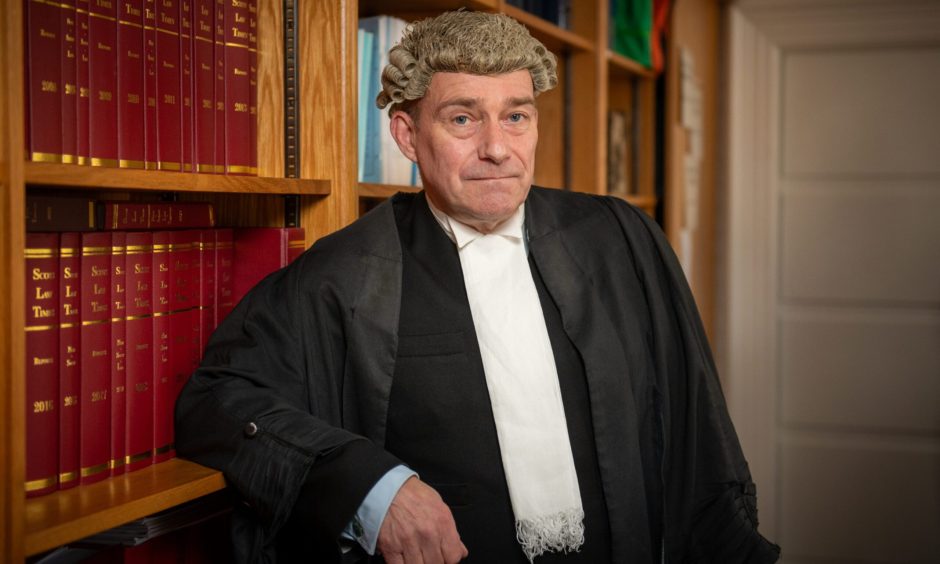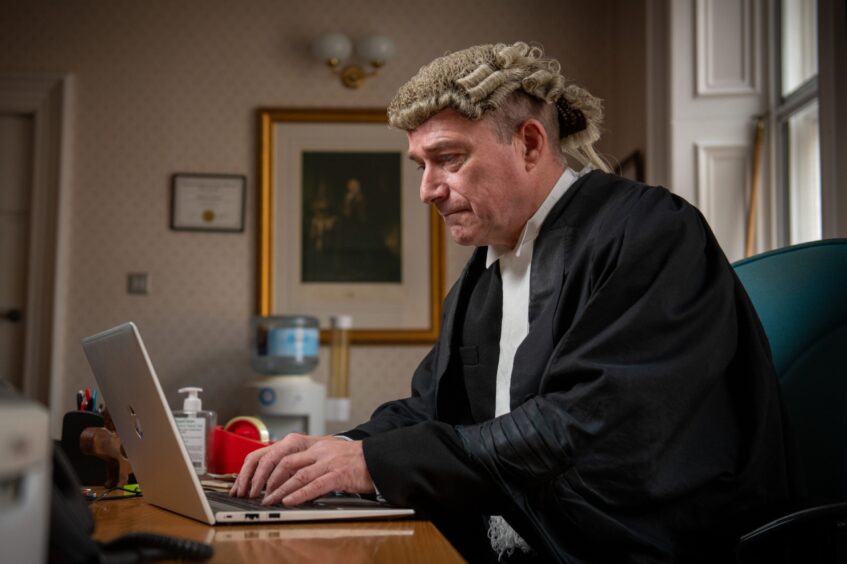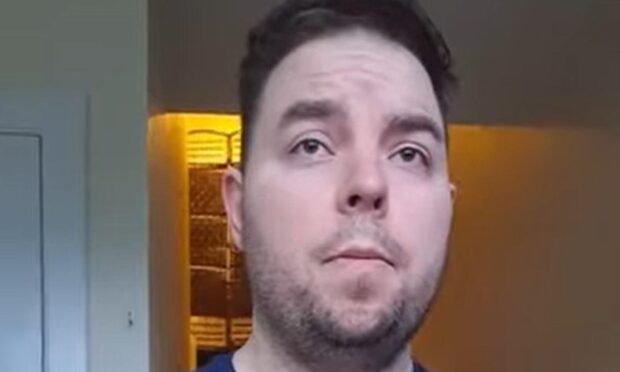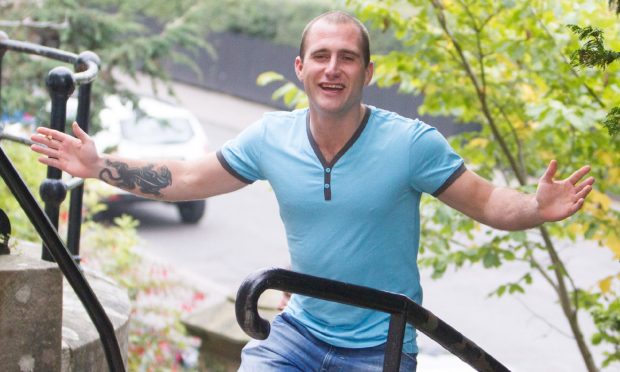
A Dundee sheriff says he is determined to carry on presiding over court cases despite being diagnosed with motor neurone disease (MND).
Sheriff Alastair Carmichael is using synthetic voice technology to continue in his role at the city’s sheriff court.
The 61-year-old, who received his diagnosis in February, said he never considered stepping down.
A wry smile is etched on Sheriff Alastair Carmichael’s face while striding across his chambers.
He juggles tidying his desk with pouring coffee for visitors, before staring down the barrel of a photographer’s lens.
In normal circumstances those are unremarkable tasks but with context, speak volumes about an unwavering perseverance.
The sheriff received a gut-wrenching diagnosis of motor neurone disease (MND) in February, nine months after first noticing his speech was faltering.
His friends and colleagues would have completely understood if he chose to quietly retreat from the unforgiving public gaze.
But that’s just not Sheriff Carmichael.
With the help of synthetic voice apps, a positive mental attitude and a healthy dose of black comedy, he is determined to carry on in an often-onerous role which is testing him like never before.
“I actually asked one guy who I was sentencing if it sounded like they were being sentenced by a Dalek,” the sheriff quips.
“I suppose if you can keep a bit of a sense of humour it can become less scary.”
His voice is noticeably slurred and laboured.
Thanks to the help of the MND team at NHS Tayside, he now regularly uses a text-to-speech phone app called SpeakUnique to address people in court.
A more advanced app, called Grid 3, could allow him to have conversations with people in real time.
The sheriff has given himself touch typing homework to make that a reality.
Modern technology is more prevalent in Scotland’s courts and Sheriff Carmichael is comforted by the “open-minded” approach from his superiors in what is uncharted territory for the judicial system.
“I suppose if you can keep a bit of a sense of humour it can become less scary.”
The 61-year-old, who has presided over cases in Dundee for almost a decade, added: “The Sheriff Principal (Gillian Wade KC) has been very supportive from the outset.
“One thing I’ve found with this is you start re-evaluating a lot of things and you really have to be adaptable so I’m having to adapt to a variety of things and the lawyers here, defence and prosecution, the staff, are also adapting to me a bit which is very helpful.
“Every time I use this app (SpeakUnique) I am less self-conscious about it but also, as my ability to speak declines, it becomes a necessity and without that, I can’t communicate and therefore, I can’t do my job.
“So, in a way, the need to be self-conscious about it disappears because it just needs to be.”
Plans are afoot to potentially utilise Grid 3 for jury trials, which he is not currently conducting, through a laptop.
The Judicial Office – the body in charge of sheriffs and judges – has explored the legal implications.
Sheriff Carmichael is “reasonably hopeful” of a return to juries but he is still pondering how to keep jurors engaged with a synthetic voice.
‘How can I do this?’
He proudly shows off an advocacy training qualification from America that hangs on his office wall.
“Advocacy has been a big part of my life – how you send a message from me to somebody and ensuring they receive the same context, the same meaning. Add in the persuasive element and you have advocacy.
“The great irony of all this, I suppose, is that it’s been a big part of my life, and I now have to turn my mind to ‘can I still communicate properly using this equipment?’
“In a way – and I don’t want to sound too cold – I’m trying to take a step back and look at it objectively.
“It’s quite an interesting question, ‘how can I do this?’
“It’s actually taken my mind off MND in a sense. It’s not about what can’t I do but what can I do?”
Lisp warning led to sheriff’s MND diagnosis
Health and fitness, too, has been a large part of his life.
Some potential MND symptoms, he jokes, could also be a sign of “getting old”.
The merciless illness causes the nerves and cells in the brain and spinal cord to degenerate, leading to severe deterioration and eventually, death.
Inspirational figures like late rugby players Doddie Weir and Rob Burrow have given greater awareness to MND in recent years.
However, Sheriff Carmichael was acutely aware of the symptoms through a close, personal connection.
“I had a bit of a lisp, which I thought at first was quite endearing but I knew it wasn’t quite right.
“My best friend had MND so I knew that if your speech is off, something is not right.
“So I went to the doctor. She gave me a thorough examination and told me that she couldn’t find anything obvious wrong.
“It got a bit worse so I went back to the doctor and they then referred me for some tests with the neurological people.
“That would have been November or December last year.”
The sheriff added: “When they said it (the diagnosis), it was very unpleasant.
“It was still a shock, yes, but part of me knew that something wasn’t right. Let’s just say I was prepared for bad news.”
Invaluable help
The assistance from the NHS and MND Scotland has proven invaluable, with the sheriff reassuring anyone in a similar position they are in safe hands.
“There’s a consultant in overall charge, there are two senior nurses, there are speech therapists. Some is for how you physically speak and others on the IT side.
“It was one of those who gave me the app and now Grid 3.
“They also have a physiotherapist, an occupational therapist, a dietician and a psychologist.
“They keep a low profile but are there if you need them – they meet you, they get to know you. If you need something you contact them. They are very professional, very good and very positive.
“They don’t pretend there’s a cure and are not promising anything that can’t be delivered. They are very pragmatic.
“Although it’s not a very nice place to be in, there is no shortage of assistance available.
Welcoming workplace
The support from his employers – which he jests is technically The King – is clearly appreciated by the sheriff.
The wry smile has made regular appearances throughout the interview.
That is momentarily replaced with a face of steady determination when asked why he still wants to work.
“I enjoy being a sheriff because there’s something new every day.
“Despite the fact we deal with some very grim things, it’s a very welcoming working environment.
“I feel I’m still contributing and I’m therefore performing a worthwhile role, and it gives me some self-respect.
“I try very much to keep a positive attitude.
“With that, on my part, and with the positivity and willingness to adapt from an employer, good things can happen.
“Whilst the IT is a big part of this, a lot of it is about mindset.
“The most important thing is I’ve always had a desire to do public service because I think I’m contributing to society – hopefully, for the good.”
There’s that smile again.













